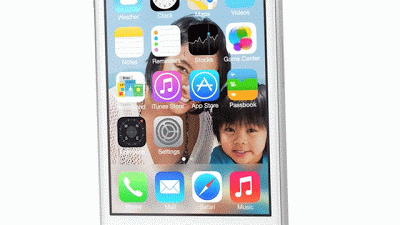
TL;DR - Demo: http://cdpn.io/qBLpj
At WWDC 2013 Apple showed off iOS7, with its layered flat-design. As you move the phone around the background moves a little to give the sense of movement. I thought this would be fun to show off in JS. As it turns out, its quite simple…
I made a little demo with a background thats 20px too tall and too wide, and simply change the background-position on either horisontal or vertial movement.
Basically there is a window.ondevicemotion that you can assign a function to. In this function I read out horisontal and vertical accelleration/movement (and ignore the much more data thats in this fantastic event), and when Im not at the outer limits of the background-image and the movement is significant (I set a sensitivity of 20 to avoid flickering when the device is not or just barely moved), I change the position by 1px in the appropriate direction.
It looks something like this
if (window.DeviceMotionEvent) { // check to see if ths feature is available
var vMov = 0,
hMov = 0,
rotation={},
phone = document.getElementById('phone'),
sensitivity = 20,
bgXPos=-10,
bgYPos=-10;
window.ondevicemotion = function(event) {
rotation = event.rotationRate
if (rotation != null) {
vMov = Math.round(rotation.alpha);
hMov = Math.round(rotation.beta);
// these two for vertical movement
if (vMov*-1 > sensitivity) {
bgYPos = ((bgYPos+1 > 0) ? 0 : bgYPos+1);
}
if (vMov > sensitivity) {
bgYPos = ((bgYPos-1 < -20) ? -20 : bgYPos-1);
}
// these two for horisontal movement
if (hMov*-1 > sensitivity) {
bgXPos = ((bgXPos+1 > 0) ? 0 : bgXPos+1);
}
if (hMov > sensitivity) {
bgXPos = ((bgXPos-1 < -20) ? -20 : bgXPos-1);
}
// now set the adjusted backgroundPosition
phone.style.backgroundPosition = bgXPos+"px "+bgYPos+"px";
}
}
}
Its not clear (after 2 seconds of googling) how the support of DeviceMotion is, but it works on my iPad3 in iOS6.
